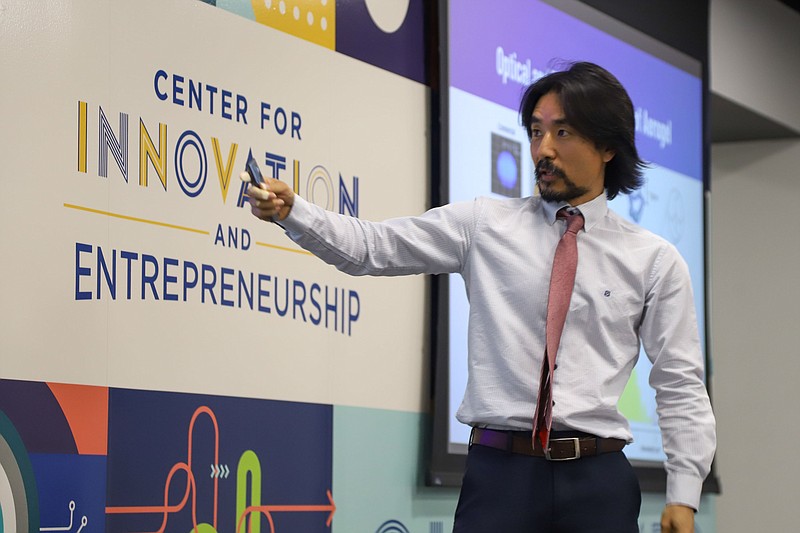Five years after joining the faculty at the University of Tennessee at Chattanooga, former MIT researcher Sungwoo Yang won the top prize Wednesday in this year's "Fly for Researchers" Faculty Pitch for his pioneering research on a new type of window insulation.
Yang, who earned his doctorate in civil and electrical engineering at Duke University and previously worked developing a new type of aerogel at the Massachusetts Institute of Technology, will receive a $20,000 grant to pursue additional work on advanced aerogel products he says could dramatically cut energy use in many homes.
Yang is developing improved translucent gels and materials that may be added to single-pane windows to dramatically reduce the loss of heating and cooling in buildings to save energy and cut power bills.
"We're developing aerogel 2.0, the next generation that will be even better and cheaper than what has already been developed," he said in an interview after winning the faculty pitch competition.
Ultimately, Yang said he hopes his design can be licensed for a producer to make the product to be sold at stores such as Home Depot to allow homeowners to easily add the aerogel insulation to their windows, which account for about a third of all lost heating or cooling in most buildings.
Although the commercial application of the next generation of aerogel is still a few years away, Yang said he continues to encourage his engineering students to pursue new ways to produce and save energy, including his leadership in developing the UTC Solar Decathlon.
A panel of judges also selected another energy-related innovation for its second-place prize and a $10,000 grant. Abdul Ofoli and Vahid Disfani, both professors of electrical engineering at UTC, are developing a drone-based artificial intelligence system to detect and assess damaged solar panels. Known as Solar Eagle, the new invention would use automated drones to survey and assess problems on solar panels without the labor-intensive reviews now required to see if solar panels have developed dust buildup, hot spots, broken glass or cracks that undermine their energy output.
"Our solution is a drone-based AI system to detect and assess damaged solar panels and generate reports of the exact damage location," Ofoli said during Wednesday's pitch. "We think this is the solution for the future."
The third place award and $5,000 was awarded for a modular balance platform known as PactBB to help people with lower back pain. The device, which was developed by engineering professor Erkan Kaplanoglu and tested by physical therapy professor Max Jordan, will be designed to move and adjust to each individual's movement. In so doing, the device will help better utilize back muscles and relieve lower back pain, which 80% of all people say they suffer from at some point in their lives.
Once commercially developed for health care providers, the machine-operated platform will use a wearable device to measure the muscular control of those with balancing or walking problems due to chronic low back pain or sports-related concussions.
Jennifer Skjellum, the commercialization counselor at UTC for the past three years, said the faculty pitches show the diversity of research being done in Chattanooga and the potential for turning academic research into commercial ventures that help society.
Hamdy Ibrahim, an assistant professor in mechanical engineering at UTC, won the $20,000 first prize in the inaugural Fly for Researchers Faculty Pitch Competition last year. Ibrahim is developing an implant made from a metal alloy that stabilizes broken bones and then is absorbed by the bone once its work is done.
Contact Dave Flessner at dflessner@timesfreepress.com or 423-757-6340.

